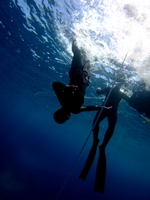Notes on Freediving
Posted by Alan on 23rd Apr 2014
Shop Diving Masks

Freediving is an exhilarating activity that allows you to see and experience underwater ecosystems without a breathing apparatus. Using nothing more than a mask, fins and a perhaps weight belt, you can dive below the surface to enjoy the aquatic environment without scuba gear attached to your back. However, there are things freedivers should follow when attempting this activity. Please note the following is for your reference as a starting point only and must not be treated as medical advice; you must consult your Physician before participating in freediving as it is inherently a risk activity.
Look But Don't Touch
One of the most alluring elements of freediving is the fact that you never know what to expect. Each dive introduces you to a new environment that's teeming with marine life. However, no matter how much you want to reach out and touch an animal or object, you should keep your hands to yourself and only observe.
From the highly venomous scorpionfish (Scorpaena mystes) to electric eels and fire coral, the ocean is filled with beautiful yet dangerous marine life. While some of these animals are obviously dangerous, such as sharks, others are not so obvious.
Buddy Up
Never attempt to freedive by yourself. Pairing up with a buddy will give you a safety net in case something goes wrong. Besides, freediving is more enjoyable when you have someone to share it with.
Check Your Weight Belt
Weights play an important role in freediving, as it allows you to descend more easily. If the weights are too heavy, though, you'll end up over-exerting yourself on the ascent. A good rule-of-thumb is to add just enough weights so you're neutrally buyout at 10 meters deep. If you get into the trouble underwater, don't be afraid to release your weight belt.
Rest Between Dives
Give your body ample time to rest and recovery between dives. Even if you feel fine, your body needs time to recover its lost oxygen so don't attempt to immediately dive again. Wait.
Know Your Physical Limits
Arguably, the single most important rule of freediving is to know – and obey – your physical limits. Without breathing apparatus, freedivers are forced to rely on the oxygen stored in their lungs. Diving too deep or staying underwater for too long is downright dangerous and potentially life-threatening. Start small and allow your body to build up the strength and lung capacity necessary for longer dives.
Don't Freedive After Scuba Diving
You should wait at least 12 hours after scuba diving before attempting to freedive. This allows your body time to process the built-up nitrogen in the tissue, which in turn protects against decompression sickness (also known as the bends).






